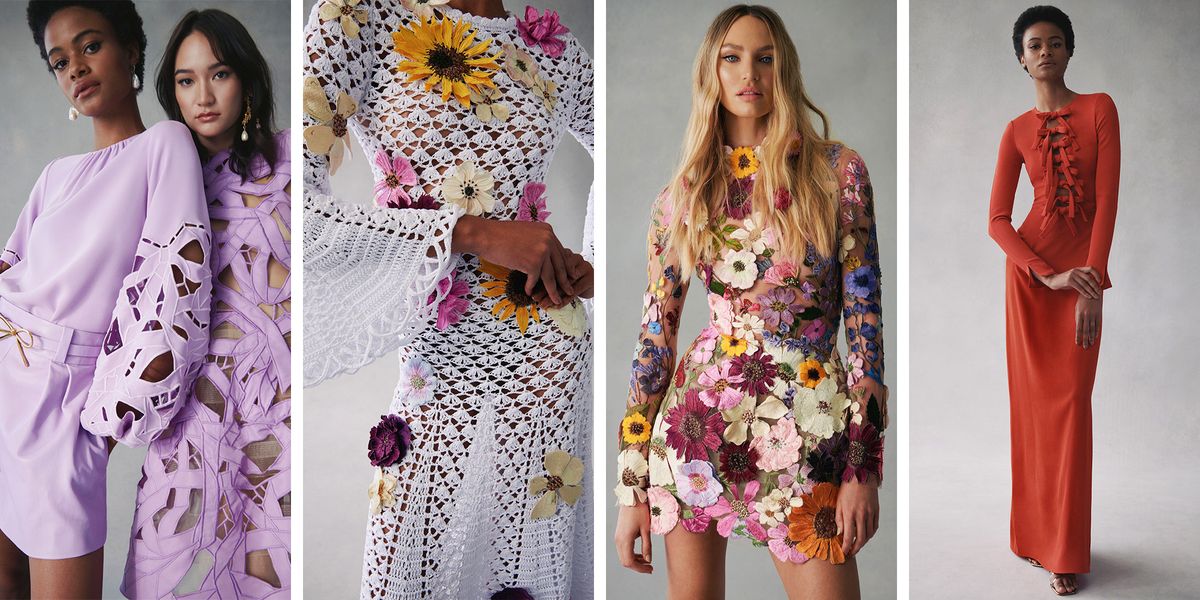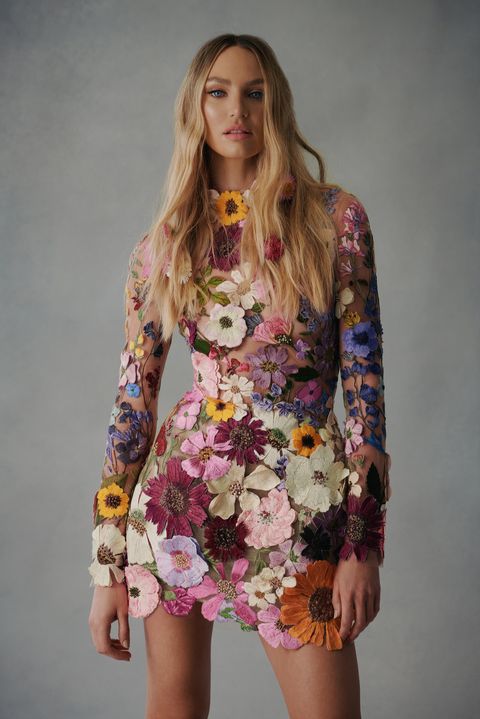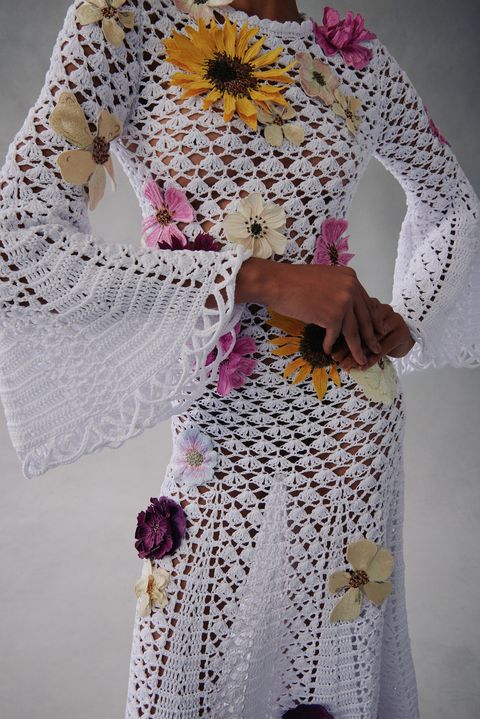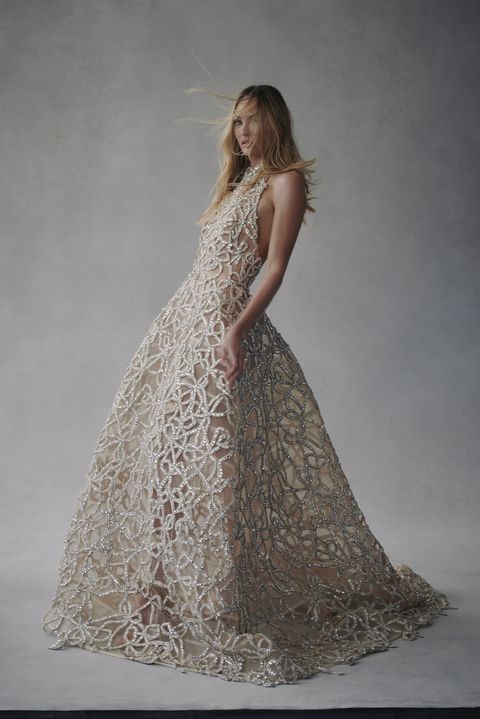“I love dressing up, I just do not want to go out,” Laura Kim shares over Zoom, sitting next to Fernando Garcia. “If last night was any indication, people are thirsty for a little bit of a dressing up,” Garcia adds. It’s the day after yet another successful (albeit virtual) awards show for the designers, dressing both Amanda Seyfried and Kaley Cuoco for the Golden Globes in Oscar de la Renta, the fashion house they’ve led since 2016. As the joint leaders and founders of their own separate label, Monse, Kim and Garcia represent the wave of American designers replacing fashion giants like Oscar himself. But it’s been five years since the co-designers took their rightful thrones (the two met over a decade ago in the atelier), and they’re just getting started.
For their fall-winter 2021 season, it’s a quiet moment of pure joy. The designers went back to the brand’s roots (and stems, and petals) with a floral-heavy collection that distracts us from the chaotic year we’ve been through. Pulling references from the flower power movement, a fitting era of revolution and change, the clothes are intended to uplift. “It just brought us back to the late 60s,” says Garcia. “I mean, they are very happy clothes, right?” The opening look, a delicately embroidered dress, imitates pressed flowers. A crochet dress looks primed for Woodstock. But in keeping with the Oscar de la Renta DNA, an edit of beautiful evening wear closes the collection.
“I feel like it was just the right amount of opulence for this time,” Garcia says.
The world, on the precipice of reopening, is finally ready for fashion that strikes that balance. ELLE.com caught up with the designers as they talked us through their inspiration behind the collection, explain what activated Kim, a South Korean immigrant, to speak up to stop anti-Asian hate, and the best advice Oscar ever gave them, below.
On their new collection
Kim: Oscar always does florals in his collection. So we still make sure we have some sort of flower every season, but this season we really loved this pressed flower story. So that’s why we are really pushing this concept.
Garcia: It was tension between the super frail fabric and aggressive embroidery. A fluttery sleeve is something that our customer definitely always comes back for. And then we took our crystal embroidery concept and did a top with the sash and a full-on ballgown. Probably the most decadent thing we designed for a very long time. It felt right to have a little bit of a ray of hope for times to come.
Designing for a transitional period
Kim: We actually had in mind that maybe we’ll be back to normal, not fully, but we put in some tailoring. In the last two seasons, we were very light on jackets and filler pieces. We still haven’t developed as much as evening pieces, because you know Oscar had a ton of evening pieces before. but we are going back to it more than last season. But overall we kind of shifted our fabrics more towards cotton than silk to make it less like event looking, it’s more like a casual, your backyard party looking. But we tried to keep everything happy. Something is like uplifting you.
Garcia: What was interesting was to see how much entertaining at home took over the business for evening wear. So the caftans that we develop have become a little bit more varied. It used to be one type of caftan before now we have one look, but now some caftans turned into gowns and it became our more relaxed approach toward evening wear.
Creating during a pandemic
Kim: Gave us a chance to kind of like be less wasteful since everything was slower. So we think twice before we spend or splice something. We are actually just looking at to be more healthier in our industry.
Garcia: It forced us to become more creative with our local resources and explore things like this flower person that we met n Los Angeles, and there’s an embroidery team in New York that can do things that are very beautiful and creative. Also, it made us look at our stock fabric and revisit colors and fabrics that we have enough to produce some beautiful things with. It pushed us to be a little bit more probably frugal, but frugality breeds creativity.
On speaking out about racism against Asians and Asian-Americans
Kim: I don’t like how people are attacking elders. That is why I started talking about it on social media. Maybe it’s because I fight back all the time, but I just felt that [these elders being attacked] don’t even get a chance to fight back. The only time that I actually remember [being discriminated against in the fashion industry] was fifteen years ago. One of our factories in Italy told me like, “Oh, we’re not in China. We can’t do that much detail.” I still work with her but I put her in her place.
Garcia: I am obviously in a different place because I don’t look ethnic, so to speak. But Laura and I are very big believers of just putting in the work, and showing the world through actions. Oscar is an immigrant, like I am and Laura is. And his company was filled with every other race in the company. So we truly have never been in a company that has felt overly white or overly one race. It’s always been a melting pot at Oscar. So we truly have never had a leader that hasn’t followed those [discriminatory] guidelines.
Kim: And Monse is actually very Asian. Those bigger companies, I think they’re just starting to learn about it. Even the way they were posting [to social media], it took them a minute to understand what’s actually going on because the whole conversation started a while ago. I think it’s more about educating the big brands because they do want to work with Asians—it’s one of the biggest consumers in the world. We are all trying to figure out how to help. Like my friend, Phillip Lim dropped a capsule of stuff [where the profits of which] is donated to helping Chinatown. When I saw Phillip doing that, I was like, “That’s actually really smart.” Instead of going through the company to do it, he’s doing it on his own. I think people are slowly figuring it out.
This content is imported from Instagram. You may be able to find the same content in another format, or you may be able to find more information, at their web site.
Advice for young designers starting their own brands
Garcia: I don’t think that that’s a good idea. Usually when people are in their 20s, they don’t know who they really are creatively speaking, or even as adults. I think that what they should do is just to work a little bit on the expense of another brand that they admire, because they will get to understand who they are and what they want to say to the world on someone else’s penny.
Oscar believed in our talent and so we grew in that company as adults and creators. I wish everybody has a boss as we did support them like when we were exploring who we were as people. And that’s what everybody should just start to look for. Somebody who will let them grow and get to know who they are for a couple of years.
The best advice Oscar ever gave
Kim: Oscar told me to be happy, don’t work too much.
Garcia: Oscar told me to stop eating rice because of gaining weight (laughs). I just clearly understood what he meant by your customer knows when you design something in a good mood. It really shows in the clothes, the excitement and the thrill and the fun in creating that piece. So that’s perennial. If you are not in a good state of mind, the product will reflect it.
This content is created and maintained by a third party, and imported onto this page to help users provide their email addresses. You may be able to find more information about this and similar content at piano.io



